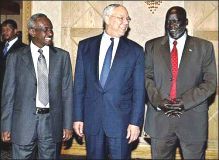Sudan peace deal ceremony opens in Nairobi
NAIROBI, Jan 9 (AFP) — A ceremony to mark the signing of a peace deal between the Sudanese government and southern rebels opened here Sunday amid high hopes for a final end to Africa’s longest-running conflict.

|
|
US Secretary of State Colin Powell (C), flanked by Sudan’s Vice President Ali Osman Taha (L) and the country’s main rebel leader John Garang walk to a press conference in Nairobi, Jan 8, 2005. (AFP). |
The pact, which formally ends 21 years of war, was to be signed by Sudan’s Vice President Ali Osman Taha and rebel leader John Garang at Kenya’s Nyayo National Stadium with a host of African heads of state and other witnesses looking on.
Sudanese President Omar el-Beshir, who put Taha in charge of the peace talks, as well as Kenyan President Mwai Kibaki, Nigerian President Olesegun Obasanjo, Ugandan President Yoweri Museveni and US Secretary of State Colin Powell were all to serve as witnesses.
Thousands of singing and dancing Sudanese, many of them refugees who live in Kenya, filled the stadium proclaiming that the deal will bring “a new dawn” to the war-ravaged country.
“I am very happy,” said Grace Datiro, 45, from southern Sudan. “I am very excited and I feel like flying home. I thank god for answering our prayers.”
Mai Arok, a 29-year-old from Garang’s hometown of Bor, echoed here sentiments.
“If there is any reason to be happy and celebrate, it’s to know that peace is dawning in Sudan,” he told AFP. “I was born into war and I thank god that he has made me live to see peace returning to Sudan.”
“This is like my birthday,” said Margaret Jones, 17. “We celebrate the end of oppression and the birth of a new country.”
The agreement is the culmination of lengthy negotiations that kicked off in earnest in Kenya in early 2002, after numerous false starts since Khartoum and the rebels adopted an agenda for such talks in 1994.
The war in the south erupted in 1983 when the rebels, led by Garang, rose up against Khartoum to end Arab and Muslim domination and marginalisation of the black, animist and Christian south.
While religion has fuelled the conflict, vast reserves of oil mostly in southern Sudan, has played an increasingly dominant role in the war that has claimed at least 1.5 million lives and left more than four million others homeless.
The cornerstone of the accord — a package of eight protocols agreed since 2002 by the two parties — is a protocol exempting the south from Sharia law and granting it six years of self rule after which it will vote in a referendum on whether to remain part of Sudan or secede.
Since then, Taha and Garang have agreed deals on transitional security, special arrangements that will be in force in three disputed areas, sharing of power and receipts accrued from oil revenue on a 50-50 basis.
Sunday’s signing will usher in a six-month pre-interim period during which both sides will carry out preparations before the official six-year transitional period starts, when the south commences running its own affairs.
SPLM/A will be operating from the southern town of Rumbek, home to United Nations and other humanitarian agencies operating in the region, while awaiting the government’s withdrawal from the larger town of Juba, also in the south.
